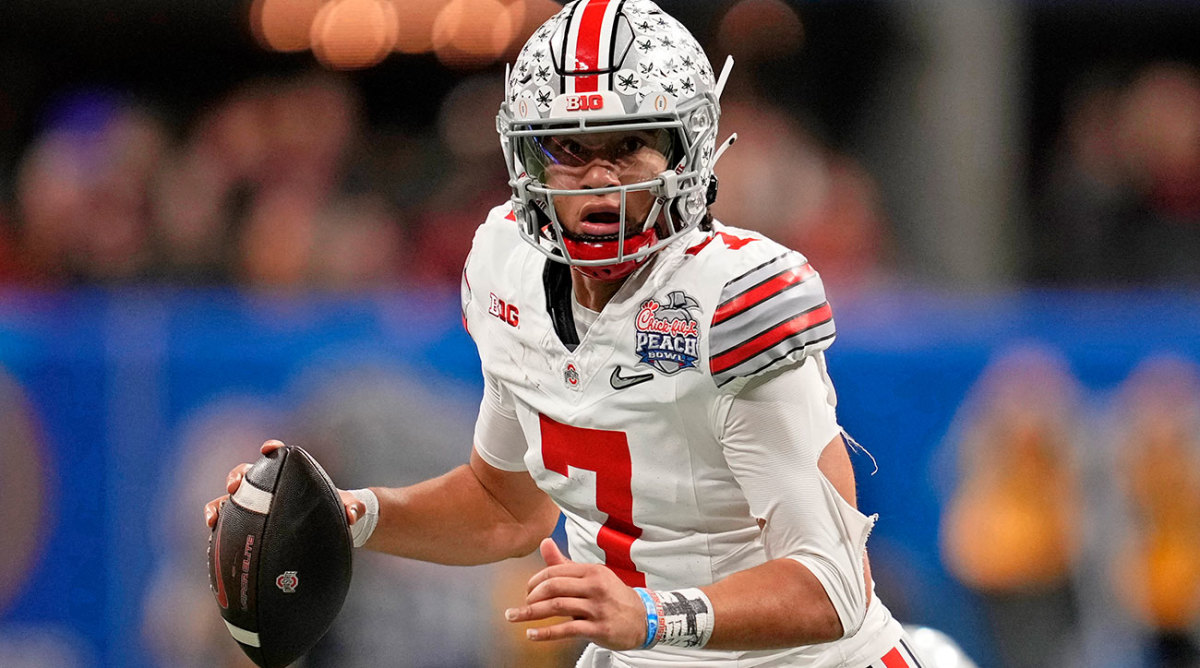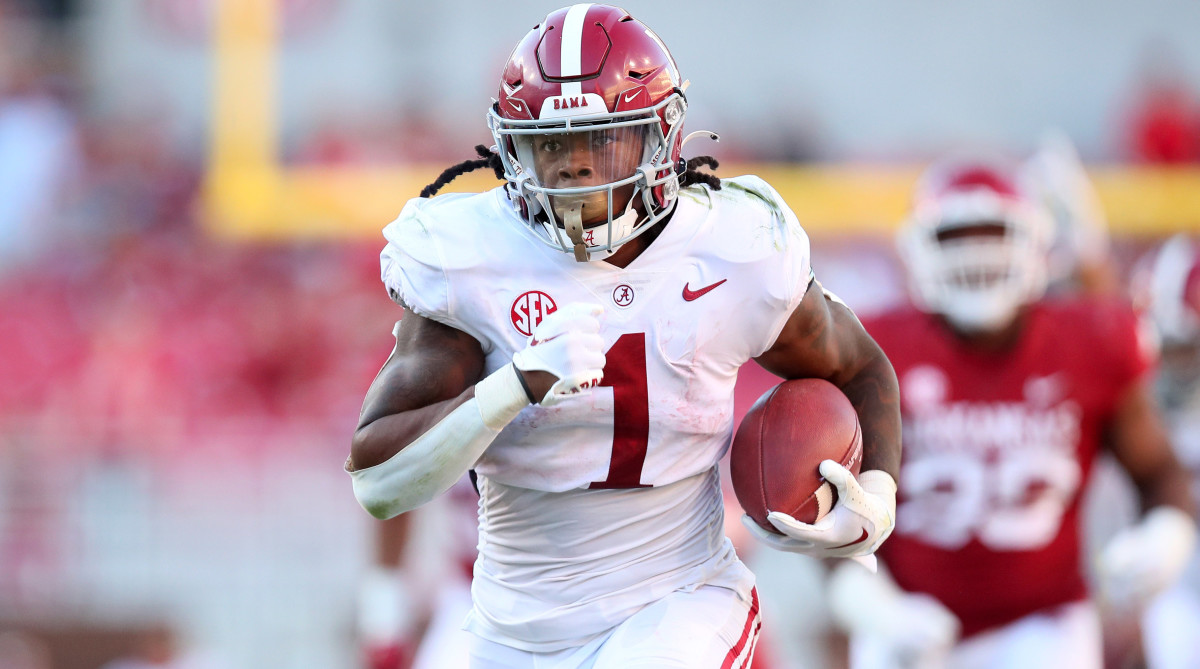2023 NFL draft: First-Round Winners and Question Marks

Ravens quarterback Lamar Jackson was the first winner on Day 1 of the NFL draft because of his massive contract extension, but he wasn’t the only one, with a handful of teams nailing the first round Thursday night.
The day also started with plenty of question marks, mainly because the Cardinals continued to make head-scratching moves. Trades throughout the first round caused plenty of chaos, including the Texans making two picks inside the top three.
But let’s not waste any more time. Here’s a list of the winners from the first round, plus all the questions we have about the not-so-good picks of Thursday night.
Winners
Seahawks
Picks: Devon Witherspoon, CB (No. 5) and Jaxon Smith-Njigba, WR (No. 20)
No team had a better Thursday night than Seattle. The Seahawks entered the first round with two picks and clear needs, and without trading up, they landed both the best cornerback and wide receiver in the draft. At No. 5, Seattle general manager John Schneider selected Illinois’ Witherspoon before snagging Smith-Njigba from Ohio State later in the round.
After surprising many with a playoff appearance in 2022, Seattle now boasts a deep receiver core while also having a potentially elite, young tandem at corner in Witherspoon and second-year man Tariq Woolen. It was a perfect night for the Seahawks, who married best player available with team needs.
Texans

Picks: C.J. Stroud, QB, No. 2 and Will Anderson Jr., OLB, No. 3
Some will criticize the Texans for trading back into the top three at a significant cost, including a first-round pick in 2024. However, Houston is in dire need of elite talent, and it got some—taking Stroud as its franchise quarterback before selecting Anderson, a player many believe is the best player in this draft.
If the Texans hit on Stroud and Anderson, they finally have true building blocks who can anchor the roster on both sides of the ball for a decade. It’s a bold, smart start to the DeMeco Ryans era.
Patriots
Pick: Christian Gonzalez, CB, No. 17
New England has long been excellent at drafting secondary players, ranging from safeties Kyle Dugger and Devin McCourty to corners Jonathan Jones and J.C. Jackson. Bill Belichick pounced after Gonzalez, who was expected to be a top-10 pick, slid down the board due to a run on offensive tackles.
Gonzalez has excellent size at 6'1" and 197 pounds, giving New England a long, active corner who can contend with the likes of Stefon Diggs, Tyreek Hill, Jaylen Waddle, Garrett Wilson and others in the AFC East.
Colts
Pick: Anthony Richardson, QB, No. 4
If you're going to swing, swing big. Instead of taking a defensive talent, the Colts tried to solve their quarterback issues with a long-term solution in Florida's Richardson. Indianapolis general manager Chris Ballard has seen five starting quarterbacks in as many years since Andrew Luck's stunning retirement in the summer of 2019, and if he's right on Richardson, the signal-caller blues are behind him.
Richardson is a dynamic athlete with a great arm. The big concern is how raw he is, having thrown less than 900 passes between high school and college. But if Richardson works out, it's a home run.
Giants
Pick: Deonte Banks, CB, No. 24
The Giants desperately needed to add a corner with top-tier potential alongside veteran Adoree' Jackson. By trading up one spot with the Jaguars, the Giants nabbed Banks, giving them such a talent. At Maryland, Banks only had two interceptions in 28 games, but his ability to play sticky coverage is evident on tape.
In defensive coordinator Wink Martindale's aggressive, blitz-happy scheme, New York is going to rely heavily on its corners to play on islands. If Banks can do that, he’ll not only improve the secondary for Big Blue, but also give the pass rush extra juice by proxy.
Question marks
Cardinals
Pick: Paris Johnson Jr., OT, No. 6
The Cardinals started Day 1 of the draft by embarrassing themselves—with a forced trade swap with the Eagles as punishment for tampering with Jonathan Gannon—and ended it by not giving Gannon’s thin defense any help in the first round. Johnson might become a solid blocker for Kyler Murray, but the Cardinals desperately need help on the defensive line (and had the opportunity to draft edge rusher Tyree Wilson, who was taken by the Raiders with the following pick). Also, the Cardinals might not have chosen the best tackle in the draft. Darnell Wright, Peter Skoronski and Broderick Jones were selected with picks 10, 11 and 14, respectively.
Lions

Pick: Jahmyr Gibbs, RB, No. 12
The Lions would have won the trade they made with the Cardinals, who used Detroit's pick to select Johnson, but then Dan Campbell’s crew reached for the second running back on the board. Gibbs is an electric playmaker, but this decision at No. 12 doesn’t make sense for multiple reasons: The Lions already have D’Andre Swift and David Montgomery, and they probably could have gotten Gibbs with their later pick, No. 18. Perhaps the Lions didn’t want to risk it after Robinson went eighth, but they didn’t need to panic with a talented offense. Detroit could have bolstered its defense with a top cornerback instead. The Lions also reached for off-ball linebacker Jack Campbell with their second first-round pick, but he at least fills a need.
Packers
Pick: Lukas Van Ness, DL, No. 13
The Packers passed on helping their first-year starting quarterback, Jordan Love, by adding Van Ness to the defensive line. There’s nothing wrong with adding a talented and versatile defensive lineman, but maybe the Packers would have been better off trading down and adding Myles Murphy or Nolan Smith, two top edge rushers who fell to the back end of the first round. And if Green Bay didn’t have a trade partner, it likely would have been better off adding a tackle or a pass catcher for Love. Tackles Broderick Jones and Anton Harrison were available, or the Packers could have picked the first wideout or tight end on the draft board.
Commanders
Pick: Emmanuel Forbes, CB, No. 16
The Commanders needed help at cornerback, but there are many questions about Forbes, who has a thin frame at 166 pounds. He has solid instincts and ball skills, but his size hurt him at times in college with penalties. Also, his lack of strength might not allow him to play as free at the next level. Washington could have gone with Gonzalez or Banks, two lengthy and athletic cornerbacks. Ron Rivera’s squad took a gamble and will need Forbes to develop quickly in an NFC East division that features physical wideouts A.J. Brown and CeeDee Lamb.
Chargers
Pick: Quentin Johnston, WR, No. 21
It’s easy to see why the Chargers bet on Johnston’s upside, but it’s also fair to ask whether they would have been better off prioritizing a cornerback such as Banks (with J.C. Jackson possibly not being ready for the start of the season because of a gruesome knee injury). Also, Los Angeles could have helped Justin Herbert with a ready-to-play-now tight end, such as Dalton Kincaid or Michael Mayer. Instead, it went for a luxury pick with Johnston, who struggled with drops in college. And there’s nothing wrong with adding weapons for Herbert, but this offense needs speed, and Zay Flowers and Jordan Addison were also available.
